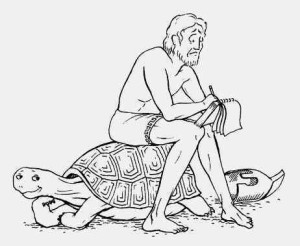ACHILLES AND THE TORTOISE by Lewis Carroll
Richard J Trudeau introduces this dialogue:
“ For many people a sticking place is that phrase, “logically deduced.” Before we proceed to an example of a material axiomatic system, therefore, I think we should spend some time talking about logic – at first in general, then as we will encounter it in this book.
“Logic: Every rational discussion involves the making of inferences. What kinds of inferences are allowed depends on who the participants are and what subject is being discussed. In this sense each type of discussion has its own special logic. For example, the sort of evidence that physicists accept as strong confirmation of a theory is rejected as totally inadequate by mathematicians trying to prove a theorem; in turn, the esoteric reasoning mathematicians sometimes employ is utterly worthless to literary critics analyzing a novel. (Indeed, there are forms of argument employed regularly in mathematics that are applicable to nothing else.) Usually, however, the term “logic” is used in a more general sense, to refer to principles of reasoning that the various special logics are presumed to have in common. The belief is that this common logic would be acceptable and potentially useful to participants in any rational discussion. Of course there’s no way of checking this without polling the entire planet, or at least scrutinizing its more than 3,000 languages, but since Greek concepts are so much a
part of the Western heritage it seems safe to say there is a widely shared logic at least among people with Western-style educations.
Though this traditional logic does not include the special techniques of modern mathematics, it does include all the forms of argument used by mathematicians in Euclid’s time. In fact, today many people, hearing the term “logic,” can think of little except the principles of reasoning used by Euclid, because the only time they have ever heard logic discussed explicitly (rather than taken for granted) was in a high school geometry course…[The soundness of our logic} has been embedded in the fabric of Western thought for more than 2,000 years. Nonetheless it is wise to take all logic with a grain of salt. It is vulnerable to doubt, on at least two counts.
I’ll let the author of Alice’s Adventures in Wonderland and Through the Looking-Glass tell you about the first:
Achilles had overtaken the Tortoise, and had seated himself comfortably on its back. Let us eaves drop on Achilles conversation with the Tortoise, his nemesis in plain logic and sense. Achilles had overtaken the Tortoise, and had seated himself comfortably on its back.
“So you’ve got to the end of our race-course?” said the Tortoise. “Even though it does consist of an infinite series of distances? I thought some wiseacre’ or other had proved that the thing couldn’t be done?”
“It can be done,” said Achilles. “It has been done! Solvitur Ambulando. You see the distances were constantly diminishing: and so-“
“But if they had constantly been increasing?” the Tortoise interrupted.
“How then?”
“Then I shouldn’t be here,” Achilles modestly replied; “and you would have got several times round the world, by this time!”
“You flatter me – flatten, I mean,” said the Tortoise; “for you are a heavy weight, and no mistake! Well now, would you like to hear of a race-course, that most people fancy they can get to the end of in two or three steps, while it really consists of an infinite number of distances, each one longer that the previous one?”
“Very much indeed!” said the Grecian warrior, as he drew from his helmet (few Grecian warrior possessed pockets in those days) an enormous note-book and a pencil.
“Proceed! And speak slowly, please! Shorthand isn’t invented yet!”
“That beautiful First Theorem of Euclid!” the Tortoise murmured dreamily. “You admire Euclid?”
“Passionately! So far, at least, as one can admire a treatise that won’t be published for some centuries to come!”
“Well, now, let’s take a little bit of the argument in that First Theorem-just two steps, and the conclusion drawn from them. Kindly enter them in your note-book. And, in order to refer to them conveniently, let’s call them A, B, and Z:
(A) Things that are equal to the same are equal to each other.
(B) The two sides of this triangle are things that are equal to the same.
(Z) The two sides of this triangle are equal to each other.
“Readers of Euclid will grant, I suppose, that Z follows logically from A and B, so that anyone who accepts A and B as true, must accept Z as true?”
“Undoubtedly! The youngest child in a high school-as soon as high schools are invented, which will not be until some two thousand years later-will grant that.”
“And if some reader had not yet accepted A and B as true, he might still accept the sequence as a valid one, I suppose?”
“No doubt such a reader might exist. He might say `I accept as true the hypothetical proposition that, if A and B be true, Z must be true; but I don’t accept A and B as true.’
Such a reader would do wisely in abandoning Euclid, and taking to football.”
“And might there not also be some reader who would say `I accept A and B as true, but I don’t accept the hypothetical’?”
“Certainly there might be. He, also, had better take to football.”
“And neither of these readers,” the Tortoise continued, “is as yet under any logical necessity to accept Z as true?”
“Quite so,” Achilles assented.
“Well, now, I want you to consider me as a reader of the second kind, and to force me, logically, to accept Z as true.”
“A tortoise playing football would be-” Achilles was beginning.
“-an anomaly, of course,” the Tortoise hastily interrupted. “Don’t wander from the point. Let’s have Z first, and football afterwards!”
“I’m to force you to accept Z, am I?” Achilles said musingly. “And your present position is that you accept A and B, but you don’t accept the hypothetical-“
“Let’s call it C,” said the Tortoise.
“-but you don’t accept:
(C) If A and B are true, Z must be true.”
“That is my present position,” said the Tortoise.
“Then I must ask you to accept C.”
“I’ll do so,” said the Tortoise, “as soon as you’ve entered it in that note-book of yours. What else have you got in it?”
“Only a few memoranda,” said Achilles, nervously fluttering the leaves: “a few memoranda of- battles in which I have distinguished myself!”
“Plenty of blank leaves, I see!” the Tortoise cheerily remarked. “We shall need them
all!” (Achilles shuddered.)
“Now write as I dictate:
(A) Things that are equal to the same are equal to each other.
(B) The two sides of this triangle are things that are equal to the same.
(C) If A and B are true, Z must be true.
(Z) The two sides of this triangle are equal to each other.”
“You should call it D, not Z,” said Achilles. “It comes next to the other three. If you
accept A and B and C, you must accept Z.”
“And why must I?”
“Because it follows logically from them. If A and B and C are true, Z must be true.
You don’t dispute that, I imagine?”
“If A and B and C are true, Z must be true,” the Tortoise thoughtfully repeated.
“That’s another hypothetical, isn’t it? And, if I failed to see its truth, I might accept A
and B and C, and still not accept Z, mightn’t I?”
“You might,” the candid hero admitted; “though such obtuseness would certainly be phenomenal”.
Still, the event is possible.”
So I must ask you to grant one more hypothetical.”
“Very good. I’m quite willing to grant it, as soon as you’ve written it down. We will call it
(D) If A and B and C are true, Z must be true.”
“Have you entered that in your note-book?”
“I have!” Achilles joyfully exclaimed, as he ran the pencil into its sheath. “And at last we’ve got to the end of this ideal race-course! Now that you accept A and B and C and D, of course you accept Z.”
“Do I?” said the Tortoise innocently. “Let’s make that quite clear. I accept A and B and C and D. Suppose I still refuse to accept Z?”
“Then Logic would take you by the throat, and force you to do it!” Achilles triumphantly replied. “Logic would tell you `You can’t help yourself. Now that you’ve accepted A and B and C and D, you must accept Z!’ So you’ve no choice, you see.”
“Whatever Logic is good enough to tell me is worth writing down,” said the Tortoise. “So enter it in your book, please. We will call it
(E) If A and B and C and D are true, Z must be true..
“Until I’ve granted that, of course, I needn’t grant Z. So it’s quite a necessary step, you see?”
“I see,” said Achilles; and there was a touch of sadness in his tone.
Here the narrator, having pressing business at the bank, was obliged to leave the
happy pair, and did not again pass the spot until some months afterwards. When he did
so, Achilles was still seated on the back of the much-enduring Tortoise, and was writing
in his note-book, which appeared to be nearly full. The Tortoise was saying, “Have you
got that last step written down? Unless I’ve lost count, that makes a thousand and one.
There are several millions more to come.”
-from “What the Tortoise Said to Achilles” by Lewis Carroll*
* Mind, Oxford University Press, new series, 4 (1895), pp. 278-280.
Carroll’s point is that the rules of logic are not dug out of the earth like diamonds; they are grounded in human intuition! The imperative feeling we have that “If A and B are true, Z must be true” cannot be defended, or reduced further. Confronted with someone who does not share that feeling, all we can do is drop the discussion and propose football instead.
A present-day mathematical logician (Rosser, in Logic for Mathematicians,McGraw-Hill, 1953, p. 11) makes the same point as follows:.
[The mathematician] should not forget that his intuition is the final authority, so that,
in case of irreconcilable conflict between his intuition and some system of… logic, he
should abandon the … logic. He can try other systems of… logic, and perhaps find
one more to his liking, but it would be difficult to change his intuition.
Much as the mathematician would like to seal his system off from intuition,
which he considers unreliable, core intuitions penetrate every barrier. Logic
itself rests on intuition, and may be contaminated with intuition’s unreliability.
We learn logic, at least informally, along with our Western languages. In this sense logic is like a pair of tinted eyeglasses with which we are fitted early in life, of which we are barely aware, and through which we become, by the standards of our culture, intellectually mature. They color everything, so naturally we tend to see confirmation wherever we look. But do they also distort? Could common logic be somehow in error? (Could millions of people be wrong?) We naturally tend not to think so. But conceivably, yes. For all we know there may be something “wrong” with our languages, or even our brains. It might be that the only people who reason correctly are a few outcasts playing football!” (Richard Trudeau: The Non-Euclidean Revolution, Birkhauser, Boston 1987, p. 10)
click here for Achilles, Part 3, THE OBLIGATORY NATURE OF SYSTEM
.

